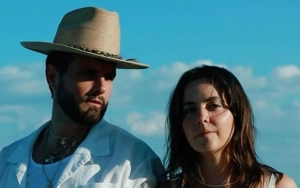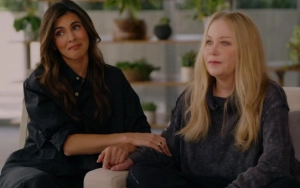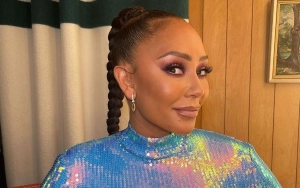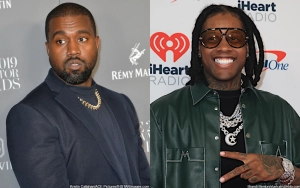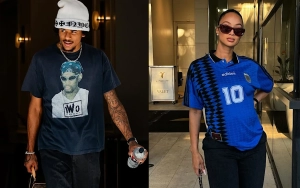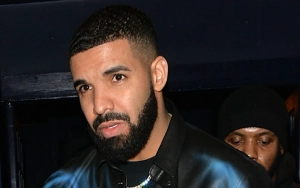
Anika Noni Rose, who voices Tiana, and composer Randy Newman talk how they join the movie, their recording session and many others.
- Mar 13, 2010
AceShowbiz - Walt Disney Animation Studios' "The Princess and the Frog" tells the story of a beautiful girl named Tiana, a frog prince who desperately wants to be human again, and a fateful kiss that leads them both on a hilarious adventure through the mystical bayous of Louisiana. It stars Broadway and movies actress, Anika Noni Rose, as the voice of Tiana.
In an interview, Rose (ANR) as well as Oscar-winning composer Randy Newman (RN) talk about their experiences when they were involved in the production process. While Rose gushes that the part when Tiana sings "Down In New Orleans" is very inspiring, Newman shares the creative process when he has to create a song to make an alligator playing the trumpet seems natural.
"The Princess and the Frog" Blu-ray and DVD will be available for purchase in U.S. stores on March 16.
Q: Randy, how different is it to write for a movie?
RN: The primary difference in a song for a film is that it's supposed to do something to put the story forward a little bit. The story doesn't stop for the song. You can tell something about someone or describe some action that is to come.
Q: What was the most important thing to get across?
RN: Different things for different scenes. No one over-arching thing. It wasn't so much what I did, but it has to be natural for people to break into song. Or animals [LAUGHS] to sing. Come to think of it, it's also got to be natural for an alligator to play the trumpet. And that was done for me, in a sense. I wrote the songs, and I think it certainly doesn't seem artificial that those songs are where they are. I mean, like the songs or not, I don't think they're inappropriate to the setting or the story.
Q: Mr. Lasseter said you spent summers in New Orleans with your family?
RN: Summers, yeah. I did. I don't know whether it had any effect on me, other than to give me bad work habits. [LAUGHTER] But, I certainly have a deep affection for the city and for the music that's associated with it.
Q: How did it affect the writing of this movie?
RN: Well, I know the music from the city, the pianists, the performers. Professor Longhair and Jelly Roll Morton and Dr. John. Louis Armstrong. King Oliver. I heard them and listen to them all the time. But I listened to them again with a different intent, looking for something to steal. And I did. I mean, I tried to do it justice with the arrangements as best I could. It may not be as good as Fletcher Anderson, but it sounds, maybe on an off-day, it sounds pretty good, the New Orleans stuff we did.
Q: Anika, how does it feel to be singing as a princess?
ANR: It's phenomenal. It's phenomenal. It's been a dream of mine my entire life to do a Disney voice. So the Princess is an elevation of my dream, even. You think when you're dreaming that you're dreaming big. And then somebody comes along and they're, like, oh, who's your fairy godmother? Now, you're the Princess! [LAUGHTER]
Randy has such a gift with his music and the ability to tell stories. I think that in today's music, we have a lot less storytelling. And that's the wonderful thing, I think, about what you do, Randy, even back to "Short People", which I'm not offended by, by the way! perfectly to this land, because every song that you hear is moving the story forward. Randy's not an easy music writer, so the things that you're listening to sound simple to the ear, which is good for kids. But it's not simple music at all. It's actually very intricate. The chord structure, the way the notes move, also help with creating an emotion emotion help move the story forward.
So it was really wonderful to be able to sing music that does that. I didn't start performing until I was about 14. I did a play. That's sort of late. Most people are, like, "I was in ballet when I was two and I was en pointe at six and I'm brilliant!" [LAUGHTER] But, I started very late, and I thought I wanted to be a recording artist. And then it switched, and I stuck with acting. I still wanted to be a recording artist, and I thought, "One way to break in would be to do soundtracks." And it occurred to me yesterday, well, that's exactly what I'm doing. [LAUGHS] This wasn't the way I was thinking of it. But it's a huge blessing. It's really an amazing thing. And when I see all these children from all different backgrounds walking around in Tiana outfits. I'm so excited about her. It really is very, very moving. And it proves that the only people who are caught up in what she looks like are the adults. The kids are caught up in who she is and that's beautiful.
Q: In the movie, what is the big performance for you?
ANR: Oh, I think she has a couple of really fantastic moments. [LAUGHTER] "Almost There" is a pretty remarkable number, particularly in the land of Princesses, because it's not the yearning, wishing, please-come-to-me song. It's, "I see my dream, it's there, on the horizon. I can feel it on my fingertips, I can smell it, I can taste it. And I'm about to hold it in realization." That's a very different song for a Princess to sing. And I think, really inspiring. And then she comes back at the end with the reprise of "Down In New Orleans", which Dr. John sings in the beginning. But you'll find that in the reprise, she has really found her voice. She has truly become this young woman, finding the fullness of who her person is. She's no longer somebody who's just searching to make that dream happen and working toward it. She's somebody who has found completeness. And so you hear a different side of her again at the end, which is pretty fantastic. I was really excited that they let me come back and sing that. So she has a couple of really, really great moments.
Q: Randy, Anika, where in the process did you get involved?
RN: I was involved two-and-a-half years ago, with the first song, which was, I think, "Down In New Orleans". I wrote it and recorded it. In the case of the songs, they were written before the animation. They animated to the songs later. The score was written after the picture. So I was involved two-and-a-half years ago.
ANR: I think I've been involved now for two years. I'm so bad at time, and it has gone by so quickly. I'm very bad at making things chronological, but it's been about two years. I've seen several ideas float by. They had their whole picture, but things have changed and tweaked and modulated to what needed to be as we've have worked on it. And we've found out more about who these characters really are sketch of what they look like about two years.
Q: Did you find working together easy?
RN: Very much so. She's singing it, and I'm trying to get her to sing it like I want it. [LAUGHTER] No, it's a collaboration. We're worked together to do the recording, along with Mitchell Froom, who produced the songs. So it's highly collaborative, at least at that point.
Q: Has your relationship with John Lasseter changed?
RN: He's very busy now. He's always dealing with rides and the studio and the animation. He's gotten better at his instincts about music, though. With the first "Toy Story", he was pretty good things that'd come up, and I'd be right, I think, in about seven or eight of the instances. But now, I think his instincts are better than mine. He'll say, "No, the joke is gonna be here," or "This should be louder than this," and I'll change it on the stand. He's kept his enthusiasm to a remarkable degree. He's really an enthusiast. And he isn't like a lot of creative people are, always looking for what's wrong. He's able to recognize what's good about something and tell you. It's very inspiring to work with him. It's sort of inspirational. Hey, that's where that word comes from! And he's still a really good guy, even though he's a billionaire or something. [LAUGHTER]
Q: How is your creative process?
RN: In the case of writing to assignment, I get as much information as I can. As many adjectives, adverbs script. And I ask them to keep it as simple as they can make it. Often people preface their remarks to say, "Well, I'm not a musician." But I don't want any musical hints, really. What you need are feelings about things, and then I'm able to execute it, and try to give them back what they gave me, only in the music.
Q: Do you believe in fairy tales?
ANR: Yes. [LAUGHTER]
Q: Is this a fairy tale for you?
ANR: Yes. I believe that, in this moment with the gift of this project, I'm living my own fairy tale. It truly is, for me, a dream come true. I feel that we need more fairy tales, particularly at this point in time. Real life has become so invasive. You can't turn on the TV or the radio, or get on the internet, without getting every intricate detail of every horror that has happened at every minute of the day. I think that children need a break from that. I think the adults need a break from that, too. We do need to be informed. But, we also need to be able to sit back and think the about the soft things in life. And I think that fairy tales are a nice way for that to happen. And then, they're not always fake. Sometimes fairy tales really do happen.
Q: Were you able to sing with the other performers, or did you sing to pre-recorded tracks?
ANR: You know, it was interesting, because I think "When I'm Human".
RN: Yeah, the gator songs.
ANR: We were together, but not. [LAUGHS] We were all in a studio that was pretty big, and the orchestra was there, sort of in the center. And then, somebody was off to one side. And I was in a room in the corner. And then, somebody was in another booth. Sometimes, I was on the outside, with the orchestra. It depended on where you were, if you could see each other. And you could hear them in the earphones, but you weren't really standing next to each other. But that's one of the few times that we actually got to work together. But there is something fantastic about working with the orchestra live, right there. You can feel that music moving through your body. It really informs the energy that you're able to give. And there were some times that Randy was making changes, as we went along with the musicians, which was just wonderful, because that also informs you. And he gets to hear where things are working in your voice a bit. That's a wonderful experience. I love recording with a live orchestra. Having everybody's energy there. [LAUGHTER].
RN: I do, too. There's something about an orchestra. It's a great thing.
ANR: It's amazing.
Q: Were the "Toy Story" movies a great adventure, to be able to develop those characters through three films?
RN: In the case of those movies? Oh, sure. I didn't know when I did the first "Toy Story" that the series would be as successful as they've been have. Artistically and financially. I would never, on my own, write a song like "You've Got A Friend". [SINGING] "You've got a friend in me." I mean, it sounds like a used car salesman or something. But, to be able to do that, and to be able to go the places you go to harmonically and orchestrally in these pictures music business is disappearing, so you've got to do something else. But, you get to places that you just wouldn't get to on your own. There's no way in writing a song for Tiana that it references much in me personally, except I try to give each character what they need. They often say that the thing about music is, when you can no longer express what you're trying to say with words, music is a way of expressing it in a more emotional way. And in most of these songs, that is the case. They couldn't exactly say with words what they express in those songs.
Q: Do you feel that somehow, you've helped to re-create the legend of Walt Disney?
RN: Well, it depends on a lot of things. I mean, I did James and the Giant Peach, and I tried just as hard doing that one as I did doing this one. And I was satisfied with what I did. But the picture didn't have a life that kind of life, for a lot of reasons.

